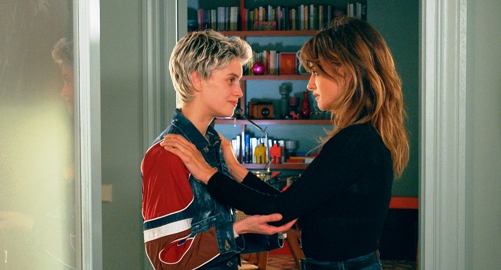
Almodóvar’s latest explores the ambiguities of motherhood, while also spotlighting the issue of memory in the Spanish Civil War.
Spanish writer and director Pedro Almodóvar’s previous film from 2019, Pain and Glory, was a triumph that to many seemed like a summing up of his entire career. Rather than trying to top that somehow, his new movie, Parallel Mothers, covers ground that by now is pretty familiar to those of us who follow his work, but at the same time, through a bit of artful misdirection, ventures into new territory.
Penélope Cruz plays Janis Martinez, a successful Madrid photographer in her late 30s. As the film opens, she’s doing a photo shoot for a magazine article about a forensic anthropologist named Arturo. After the shoot, she asks him for a favor. Her great-grandfather was shot by the fascists in 1936, during the Spanish civil war, and buried in an unmarked grave along with several other people from her home town. Her family and the people of the town want the grave exhumed so that the bodies can get proper burials, but the government is dragging its feet. Could Arturo use his influence to expedite the matter? He promises to try. They get together for drinks, and one thing naturally leading to another, they go to bed, although he’s a married man.
Cut to nine months later. Janis is pregnant; in the birth center she rooms with a pregnant teenage girl named Ana, played by Milena Smit, whom she helps get through her fears about giving birth. Ana’s mother is an ambitious and self-absorbed actress about to get her first break in the theater, leaving Madrid just when her daughter needs her most, and so Janis becomes something of a big sister to Ana. Both births are successful, and they both have daughters. But then, when Arturo visits to see the baby, he makes a comment that enrages Janis but also plants a seed of doubt in her mind about his paternity, and she begins to suspect that the babies got mixed up somehow at the hospital.
Almodóvar has always loved to take themes and motifs from romances, pulp fiction, or soap operas, and use them to deal with themes that are dear to him. The idea of babies that are accidentally switched at birth is really one of the soapiest of plot devices you can think of, although it also has roots in the comic tradition going back all the way to ancient Roman drama. In this case, the plot is a way for Almodóvar to explore motherhood, a constant obsession in his films, and in this case also the relationships between mothers, and how they can be painful or fruitful depending on the decisions they make. Janis’s decision is to bring Ana closer to her by hiring her as her live-in-maid and babysitter.
Now, the interest here, despite how it may look, is not in the outlandish situation, but in the character of two women, the brave but emotionally conflicted Janis, and the immature, mixed-up, but intrepid teenage mother Ana. The young Milena Smit is a compelling presence in the film, and a good match of opposites with Penélope Cruz. Cruz, on the other hand, so perfectly embodies her role that she seems almost like a medium for Almodóvar’s intimate notions and issues. Thus the title, Parallel Mothers. The women are different, but their lives are parallel and work best together. Or as a t-shirt says that Janis wears, “We should all be feminists.”
But wait. Just like the babies getting switched, so Almodóvar performs a switcheroo on us. As we near the end of the film, the sub-plot about exhuming the civil war grave in Janis’s town takes center stage. This is a theme right out of the news: Spain is now going through yet more pain and controversy around the war in the ‘30s that ended with a fascist victory. Relatives of the many people shot by Franco’s army are demanding that the mass graves be exhumed, while those who want to forget the past and sweep it under the rug are resisting. The two strands of narrative now combine, and although I don’t think this development is completely successful, the picture is still a solid effort by Almodóvar, who is taking a stand for the importance of memory in Spain, and for exposing the wounds of the war rather than hiding them. The movie, so centered on mothers and family, concludes on the moving note of grief and honor by the families of those whose lives were unjustly taken. Parallel Mothers makes a connection between our private dramas and our public shame.

The story of the early life and career of an innovative German painter dramatizes the troubled history of that country from the Nazi period...

The endlessly cyclical nature of life is depicted as four different stories in a sleepy Italian village. Le Quattro Volte, a film from 2010...

Steven Soderbergh’s return to the big screen is a comedy heist film with a southern blue collar flavor. Steven Soderbergh, one of our best...